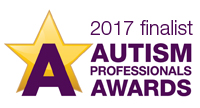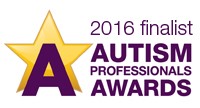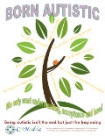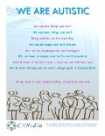Autism Spectrum Disorder (ASD)
Neurodiversity is about how our brains process information and how we think, as we can be wired differently. This includes concentration, language, sound, images, light, texture, colour, touch, smell, taste, perception, sequencing and movement. One major neuro-diverse type is listed below
What is ASD? Every individual that has this condition will be affected differently and it is a lifelong developmental disorder. Fundamentally it means that people will have a weakness in dealing with social situations. People can have problems expressing themselves emotionally. People can have unusual sensitivity to their environment, which can cause them a flight, fight or freeze situation. Because their understanding is different they can see and think differently about the world around them. As their behaviours are different it can cause people all sorts of day to day challenges.
 Social Communication
Social Communication
- Problems with verbal and non-verbal communication.
- May find it hard when talking with people to keep a conversation going or not knowing what to talk about.
- May lack understanding of when to start or end a conversation.
- May often talk about themselves and their interests going off on a tangent.
- May not understand what is being said or lack understanding of what is expected of them.
- Can be very literal and may not understand jokes, sarcasm, phrases, idioms, humour and slang.
- Repetitive questioning and echolalia.
 Social Interaction
Social Interaction
- Often find it hard to make and maintain friendships.
- May lack understanding of social rules and inappropriate behaviours or manners.
- Can find others confusing and unpredictable.
- May stand back from the rest of the group or shy away from the company of others.
- May appear not to listen when spoken to or may be living in their own world.
- May find eye contact hard to maintain or uncomfortable due to processing difficulties.
- May not understand other people’s feelings, facial expression, body language, thoughts, actions, voice tones and how close to stand next to someone (i.e. personal space).
 Social Flexibilty
Social Flexibilty
- May have difficulty dealing with situations, due to problems imagining the outcome or possible dangers.
- Can find it hard to know what is going to happen next.
- Inflexibility of thought and a marked resistance to change, especially without warning.
- May be moody and overreact emotionally, temper tantrums or outbursts resulting in others viewing you or your child as disrespectful or needy.
- May have difficulty transitioning from one activity to another.
- Can demonstrate repetitive behaviour patterns or rituals.
- May have special interests, narrow obsessions, passions, or drives.
It’s estimated over 500,000 people in the UK have Autism or Asperger Syndrome.
The one thing that could be said about people who have ASD is that they have a unique view of the world around them, which can be a good thing. Many have their own specialist interest which they can have a high level of knowledge about. They can also be creative, have good visual skills, have good technical skills and have a high attention to detail.
No matter how intelligent men and women are they can still feel misunderstood and vulnerable.
Downloads
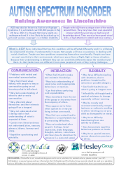 Click to download a poster on ASD
Click to download a poster on ASD
Facts
- Autism Spectrum Disorder (ASD), is not a mental illness. It is a developmental disorder and associated with learning difficulties.
- Some people think you can catch it, you cannot. There is a genetic connection.
- Individuals may have more than one neuro-diversity, as they overlap each other.
- One third of adults in the UK with an Autism Spectrum Disorder (ASD) are currently without employment or access to benefits. Only 15% have a full-time job. 79% of those on incapacity benefit want to work.
- Every Job Centre Plus office has a Disability Employment Adviser who specifically deals with people with health conditions. They don’t just help people find work, they also help people keep their jobs.
- In 1995, the UK passed the Disability Discrimination Act, making it illegal to deny people employment based on disability. Employers in the UK are required to anticipate and make “reasonable adjustments” for people with disabilities.
The above is about raising awareness in Lincolnshire and not intended as a medical document or advice. If you need any advice with regards to a medical or psychological problem, please contact your GP.
Please note that if you ever use Twitter or Facebook, please DO NOT give out any personal details or information about yourself, as CANadda will not be held responsible for anything that happens. Remember to use social networking sites wisely.
Contacts:
The National Autistic Society
393 City Road
London
EC1V 1NG
Switchboard: 020 7833 2299
Fax: 020 7833 9666
Email: nas@nas.org.uk
Web site: www.autism.org.uk
Autism Helpline: 0808 800 4104
Education Rights Service: 0808 800 4102
Parent-to-Parent Service: 0808 800 4106
Autism Care (UK) Limited
Heath Farm
Heath Road
Scopwick
Lincolnshire
LN4 3JD
Telephone: 01526 322444
Fax: 01526 323600
Autism Anglia
Telephone: 01206 577678
Email: info@autism-anglia.org.uk
Website: www.autism-anglia.org.uk
Useful Links:
- If you are undiagnosed with ASD, you can get an initial test on line. This test is not a diagnosis but it is FREE of charge, https://archive.wired.com/wired/archive/9.12/aqtest.html
- Wrong Planet Autism and Aspergers: wrongplanet.net
- Autism Forum: www.asd-forum.org.uk
- The National Autistic Society (NAS) – a national charity that champions the interests of people with autism.
- The TEACCH approach – an outline of the TEACCH approach NAS
- SPELL – The National Autistic Society’s framework for understanding and responding to the needs of children and adults on the autism spectrum
- Aspie Quiz. Please note that this quiz is not a diagnosis, it only provides an indication of autism spectrum traits in adults. For a diagnosis, you should always seek advice from a professional.
- Doctors are failing to spot Aspergers in girls
- DAsperger's Syndrome in Women & Girls – Dr Tony Attwood
- www.mugsy.org/infosheets.pdf – List of useful information sheets and leaflets that are available from the National Autistic Society. This is a PDF download.
- www.ambitiousaboutautism.org.uk – Ambitious about Autism is the national charity for children and young people with autism.
- www.nice.org.uk/Guidance/CG128 – Autism spectrum disorder in under 19s: recognition, referral and diagnosis.
- carolgraysocialstories.com – Autism spectrum disorder in under 19s: recognition, referral and diagnosis.
Employment Related information
Message Board regarding medical assessments for Employment Support Allowance. This thread also contains other useful web links.
https://www.asd-forum.org.uk/forum/index.php?/topic/24468-medical-for-esa-or-incapacity-benefit/
Further Information
Autism Help: www.autismhelp.info
FREE BOOK
Coping: A survival Guide for People with Aspergers Syndrome.
Adapted from Segar, M. (1997).
Ravenshead: Noraca Publications.
To download for free go to: www-users.cs.york.ac.uk/~alistair/survival/
Managing Money
The National Autistic Society has teamed up with the Consumer Financial Education Body (CFEB) as part of the national strategy for financial capability to support people with autism in managing their personal finances.
Managing Money provides a new online resource, developed in consultation with people with autism, which gives impartial information, guidance, interactive quizzes and video content to help people develop their knowledge and confidence in managing money and financial decision-making. It can be used at home or in educational settings.
A free printed workbook called Managing Money: a guide for people on the autism spectrum is also available. It can be ordered or downloaded from https://www.fca.org.uk/publication/documents/everyday-banking-easy-read-guide.pdf.
You can visit the Managing Money website at https://www.autism.org.uk
Self-advocacy Fact Sheet
A very useful self-advocacy fact sheet here: https://www.disabilityrightsuk.org/resources/self-advocacy
Inspirational Autism
Hello there, I have toured the UK speaking at conferences and events about my life experiences with Aspergers Syndrome for over four years now and I am thrilled to share with you a clip from one of my speeches on YouTube. The video was listed as one of the best autism YouTube videos of 2011 by Thautcast.com in December.
I am letting many organisations know about the video as I feel it highlights a very positive outlook on autism (It’s already been watched in 70 countries). I think its essential that we highlight the positives of ASD worldwide and encourage others to see it in a positive light. Please feel free to use the clip in your training sessions etc. Also feel free to forward the video to your colleagues/parents/mailing lists or post the video on your website/facebook/twitter etc. as the video is designed to inform, entertain and hopefully to inspire the many individuals with ASD and their families/support staff.
Thank you very much
Best wishes
Tony Attwood
